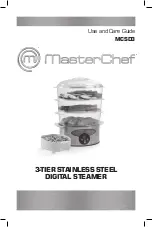
22
23
DANGER of electric shock
• Do not operate the shaver if the shaver, the wall power
supply or the cable shows visible signs of damage or if the
shaver has been dropped.
• Connect the cable to the shaver before plugging the wall
power supply into a power point.
• Only connect the wall power supply to a properly installed easy to
access power point supplying voltage matching the rating plate.
The power point must still be easily accessible after connection.
• Ensure that the cable cannot be damaged by sharp edges or hot
surfaces.
• Ensure that the cable is not trapped or crushed. Do not wrap the
cord around the appliance or the wall power supply (risk of cable
break!).
• Always pull at the wall power supply and never pull on the cable
when unplugging the wall power supply.
• Remove the wall power supply from the power point …
…
after each use,
…
after each charging process,
…
if a fault occurs,
…
before connecting the device to the cable,
…
before cleaning the shaver and
…
during thunderstorms.
• To avoid any risk, do not make any changes to the shaver or acces-
sories. Do not replace the cable yourself either. Repairs should only
be carried out by a specialist.
DANGER! To be observed when handling
lithium-ion batteries
Improper use may lead to injuries and material damages!
Fire and explosion risk in case of noncompliance.
The following safety instructions are to be observed to
ensure safe handling of lithium-ion batteries:
• Charge the appliance with the original wall power supply only.
• Protect the lithium-ion batteries from mechanical damages.
Fire/explosion hazard!
• Do not expose the appliance to direct sunlight or heat. If the
appliance heats to more than 125 °C, the cells may catch fire and/
or explode.
• Should the appliance be in vicinity of a source of fire or catch fire
itself, usual extinguishing agents can be used (ABC powder extin-
guishers, CO2 extinguishers or water).
• Lithium-ion batteries contain flammable and corrosive solutions
and lithium salts. In case of leakage, these can lead to irritation
of the skin, eyes and mucous membranes. Venting of lithium-ion
batteries generates vapours which may present a hazard to health.
• If fluid leaks out of the lithium-ion batteries, avoid contact with
eyes, mucous membranes and skin as well as inhaling vapours.
The affected area must be immediately rinsed with plenty of clean
water. Consult a doctor in any case.
• Leaked fluids must be absorbed by means of an absorbentb and
disposed of properly.
• Open cells are hazardous waste and must therefore be disposed of
properly.






































